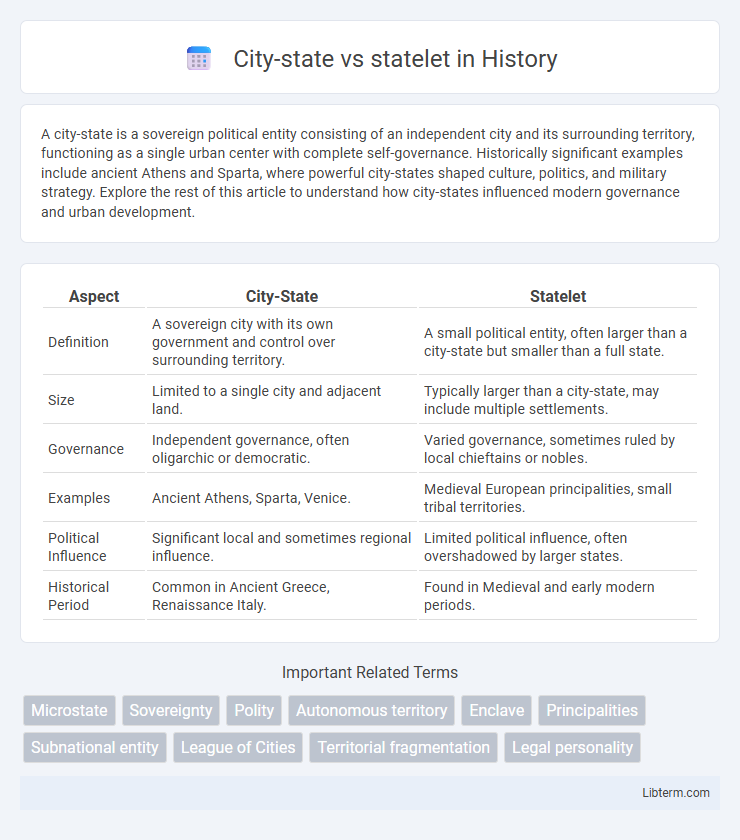A city-state is a sovereign political entity consisting of an independent city and its surrounding territory, functioning as a single urban center with complete self-governance. Historically significant examples include ancient Athens and Sparta, where powerful city-states shaped culture, politics, and military strategy. Explore the rest of this article to understand how city-states influenced modern governance and urban development.
Table of Comparison
| Aspect | City-State | Statelet |
|---|---|---|
| Definition | A sovereign city with its own government and control over surrounding territory. | A small political entity, often larger than a city-state but smaller than a full state. |
| Size | Limited to a single city and adjacent land. | Typically larger than a city-state, may include multiple settlements. |
| Governance | Independent governance, often oligarchic or democratic. | Varied governance, sometimes ruled by local chieftains or nobles. |
| Examples | Ancient Athens, Sparta, Venice. | Medieval European principalities, small tribal territories. |
| Political Influence | Significant local and sometimes regional influence. | Limited political influence, often overshadowed by larger states. |
| Historical Period | Common in Ancient Greece, Renaissance Italy. | Found in Medieval and early modern periods. |
Defining City-State: Historical and Modern Perspectives
A city-state is a sovereign political entity consisting of a city and its surrounding territory, historically exemplified by ancient Athens and modern Singapore, characterized by centralized governance and full autonomy. Unlike smaller statelets, which often lack comprehensive self-governance and international recognition, city-states exercise independent control over domestic and foreign affairs. The evolution of city-states reflects a spectrum from ancient urban centers with military and economic power to contemporary microstates maintaining legal and diplomatic sovereignty.
Understanding Statelet: Terminology and Context
A statelet refers to a small, autonomous political entity often smaller than a typical city-state, characterized by limited territorial control and governance. Unlike city-states, which usually encompass an urban center and its surrounding lands with significant political and economic influence, statelets tend to possess minimal infrastructure and are frequently dependent on larger powers for survival. Understanding the distinction in terminology highlights the varying scales of sovereignty and administrative complexity within historical and contemporary political geography.
Key Differences Between City-States and Statelets
City-states are fully sovereign entities with organized governments, defined territories, and the capacity to engage in diplomacy or warfare independently, exemplified by ancient Athens and Singapore. In contrast, statelets are smaller, less formal political units often lacking full sovereignty and dependent on larger states for protection or governance, typical of tribal chiefdoms or autonomous regions. The key differences lie in sovereignty, political organization, and international recognition, where city-states function as independent nations, while statelets operate as semi-autonomous or vassal territories.
Origins and Evolution: City-States in History
City-states originated in ancient Mesopotamia and Greece as independent political entities centered around a single urban area with its surrounding territory, evolving through trade, military strength, and administrative complexity. Unlike statelets, which are smaller and less politically stable regions often absorbed by larger states, city-states such as Athens and Venice developed sophisticated legal systems and economic networks that shaped early governance models. Over time, city-states transitioned into more expansive states or were integrated into larger kingdoms, influencing the evolution of modern nation-states.
The Political Structure of City-States vs. Statelets
City-states feature centralized political authority with defined governance structures, often led by a monarch, council, or elected officials overseeing urban and surrounding rural areas. Statelets possess fragmented or less formal political systems, with localized leaders or clan-based rule exerting limited control beyond their immediate territories. The governance of city-states supports complex administrative functions and infrastructure, contrasting with the minimal bureaucratic organization typical of statelets.
Economic Power and Influence: City-State vs. Statelet
City-states often exhibit concentrated economic power through robust trade networks, advanced infrastructure, and specialized industries that fuel their influence both regionally and internationally. Statelets typically maintain limited economic capabilities, relying on localized resources and smaller-scale commerce that constrain their expansion and political leverage. The strategic position and economic diversification of city-states enable them to exert greater diplomatic and military influence compared to the more insular and economically modest statelets.
Case Studies: Famous City-States and Notable Statelets
Ancient Athens exemplifies a powerful city-state that combined urban governance with expansive influence, while Singapore represents a modern city-state with significant economic and political autonomy. In contrast, statelets like the medieval Hanseatic League's Lubeck maintained localized control over limited territory and resources without extensive sovereignty. The distinction in scale and political functionality is evident in case studies such as Rome's Roman Republic versus smaller entities like the Free City of Danzig.
International Recognition and Sovereignty Issues
City-states such as Singapore enjoy full international recognition and possess complete sovereignty, enabling them to independently enter treaties and join global organizations like the United Nations. Statelets, in contrast, often lack formal recognition and face limited sovereignty, restricting their ability to participate in international diplomacy or enforce external policies. This disparity creates significant challenges for statelets in asserting legal authority and securing global legitimacy compared to fully recognized city-states.
Contemporary Relevance: City-States and Statelets Today
City-states and statelets remain significant in contemporary geopolitics, exemplified by Singapore and Monaco, which operate with substantial autonomy despite their limited size. These entities wield considerable economic, cultural, and political influence regionally and globally due to strategic governance and specialized economies. Their resilience highlights the evolving role of micro-sovereignties in addressing modern urban challenges and global integration.
Future Trends: The Role of City-States and Statelets in Global Politics
City-states and statelets increasingly influence global politics by leveraging economic innovation hubs and digital governance models, driving decentralized power dynamics in international relations. Advances in technology and urban infrastructure enable city-states to assert soft power through cultural exports, trade, and diplomacy, challenging traditional nation-state authority. The growing importance of specialized statelets in strategic regions reflects a trend toward localized governance with global impact in economic and geopolitical arenas.
City-state Infographic

 libterm.com
libterm.com